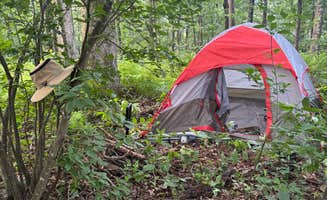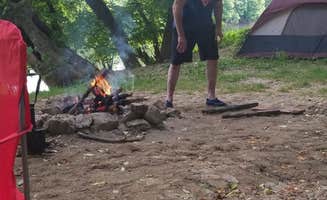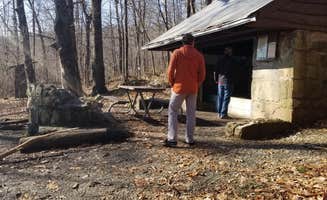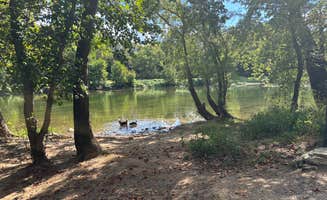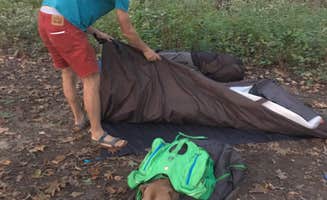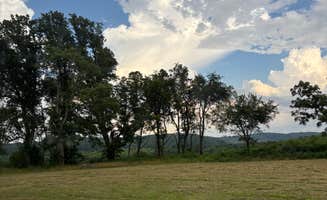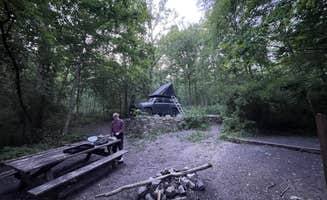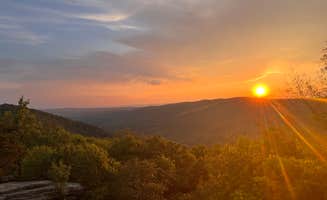Dispersed camping near Somerset, Virginia offers primitive sites throughout the George Washington National Forest and Shenandoah National Park. Elevations range from 1,000 to over 3,000 feet, creating microclimates that affect camping conditions significantly across relatively short distances. The area's geological foundation of quartzite and greenstone creates distinctive terrain features and seasonal water sources that campers should plan around when selecting sites.
What to do
Waterfall hiking access: Near Laurel Prong Trail Dispersed, hikers can access several waterfall trails with moderate difficulty ratings. One camper noted, "Good views on the hike," while mentioning that finding ideal spots can be challenging as "the easy camping might be a slight exaggeration."
River activities: The South Fork Shenandoah River area offers swimming, fishing, and paddling opportunities right from your campsite. A visitor reported, "We swam and fished. There were plenty of walk-in sites beyond ours," making it ideal for those seeking water recreation without hauling gear far.
Backcountry exploration: The Veach Gap trail provides a 4-mile hike with 1,200 feet of elevation gain leading to ridgeline camping. A hiker shared, "Breathtaking views of the Shenandoah River and surrounding mountains. Very much worth the 4 mile hike up to the site," adding that fall brings spectacular leaf colors.
Wildlife observation: Early mornings and evenings provide opportunities to spot deer, black bears, and various bird species. Practice proper wildlife etiquette by maintaining distance and using binoculars. Hikers at Veach Gap mentioned consistent wildlife sightings during dawn hours.
What campers like
Established fire rings: Many rustic sites in the Somerset area include existing fire rings, particularly at Crisman Hollow Road Camp where a reviewer mentioned, "It's a quiet area with many spots right on the water," ideal for evening campfires when seasonal restrictions allow.
Seasonal isolation: Fall and early spring weekdays offer the most solitude. A camper at Little Fort Campground said, "I arrive at 7:30pm on a Saturday in late August and thought I might be too late to get a spot but there were only two other groups there so I had my pick of most of the sites."
River sounds: Multiple campers mention the calming effect of riverside camping. One visitor reported, "The site at the end of the road is beautiful. We stayed right at the end of the road, since we have a 30 foot RV, but there are sites you can walk to all the way down the river."
Basic amenities at select sites: While most Somerset area dispersed camping is primitive, a few locations offer minimal facilities. A Little Fort Campground user shared, "Site had a fire pit, table, parking spot, and tent platform. Bathrooms and bear proof trash was provided."
What you should know
Bear activity: Black bears are common throughout the region, particularly in spring and fall. A camper at Veach Gap - GWNF - Backpacking Site advised, "Pack up all the water you will need for the day/evening/morning. Once you get to the top there are several sites with little fire rings," noting you should follow Leave No Trace principles.
Water access variations: Seasonal changes dramatically affect water availability. One backpacker explained, "There is no water after the first mile. I have seen a small trickle part way up the mountain, but don't count on it."
Variable cell service: Connectivity changes dramatically with terrain. A visitor noted, "Cell service at the top (not during the hike or on the road to the trailhead so prepare directions)," while another reported, "This page says that Verizon has limited service but I have a Verizon prepaid plan and I had no service at all."
Permit requirements: Most backcountry sites require permits, especially in Shenandoah National Park. For Wildlife Management Areas, a specific permit system applies: "You simply need to purchase either a daily or annual access pass from the DWR website and then report which days you will be staying at the WMA--it's currently $23 for the annual pass."
Tips for camping with families
Site selection strategy: Choose locations with clear boundaries and natural barriers. At Shenandoah National Park Dispersed Sites, one family noted, "I recently led a large group of Scouts to the Mathews Arm Campground in SNP. We spread out over 4 RV/camper/tent sites as our base camp."
Educational opportunities: The park's varying elevations create teachable moments about ecosystems. One visitor observed, "The Shenandoah mountains and the NPS's campgrounds never get old. They always offer a unique experience," noting the area is "suitable for novice campers to experienced off-trail campers."
Noise considerations: Some areas experience unexpected noise. A camper warned, "Dont disregard the warnings about noise like I did, constant speakers all the time until 4am. I think its out of jurisdiction for park rangers so they wont do anything either."
Trail difficulty assessment: When backpacking with kids, carefully evaluate trail reports. One family reported, "This campsite is another one we found on a list provided by Shenandoah's park rangers and was listed as moderate hike and easy camping. I think, just like some other on the list, the easy camping might be a slight exaggeration."
Tips from RVers
Road condition awareness: Access roads vary significantly in quality. An RVer at James River Wildlife Management Area - Dispersed Camping noted, "After turning onto Midway Mills Lane from the northern end (route 626), there is a gravel access road about .5 miles down the road that is well-maintained."
Parking limitations: Many sites have specific RV restrictions. One camper advised, "For me being in the 29 foot class C, I opted to park it in a field/parking area at the entrance," rather than attempting to navigate to the riverside sites.
Service planning: Limited amenities require advance preparation. A reviewer explained, "It is 20 minutes from the closest grocery store (Food Lion), liquor store, gas station, and propane supplier (Foster Fuels)," emphasizing the need for supply planning.
Long-term options: Some remote areas allow extended stays. One RVer shared, "This is where we stay any time I need to work in-office down in Lynchburg, VA," noting the site provides quietude despite occasional hunting activity in the distance.


